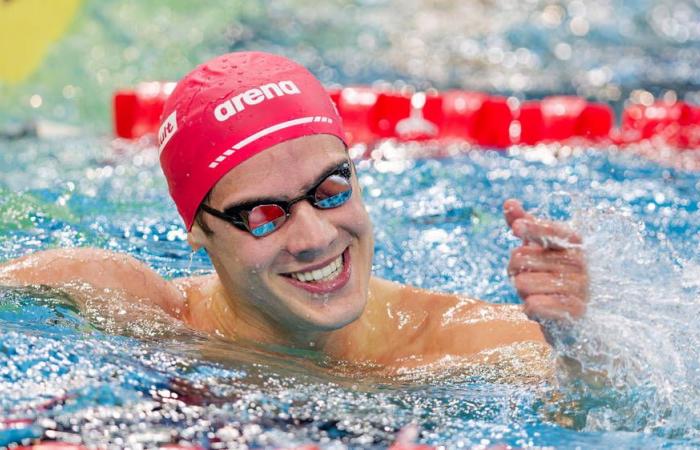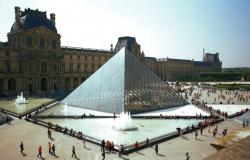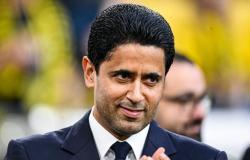Noè Ponti (23 years old) returns from Asia with high morale. The Ticino has a string of World Cup victories in Shanghai, Incheon and Singapore.
Along the way, he set two world records in the 50m butterfly and a European record in the 100m butterfly. One day after returning to Switzerland, Ponti joined Magglingen to complete the recruit school reserved for elite athletes. He gave an interview to Keystone-ATS.
Noè Ponti, what emotions do you remember from these last weeks in Asia?
‘It was a great experience, one of the best of my life. A lot happened, I won a lot and broke records. Thousands of emotions, I would say! Plus, I met new friends and got to know a lot of people. It was just great.’
You measured yourself against Léon Marchand and bore the comparison well with the four-time Olympic champion. Being at the level of such a champion is what you train for, right?
‘It would have been better if this had also been the case in Paris. But obviously, these last few weeks have been good. Léon is currently one of the best athletes in the world, not just in swimming. I was very close to him, and we even won a tie race. Being able to swim against the best in the world gave me a lot of pleasure.’
An expected record
In Shanghai, during the first stage of the World Cup, you directly broke the world record in the 50m butterfly. Did you immediately notice the magnitude of the feat?
‘I knew the record, because I had been thinking about this time for a year, or a little more. I knew it could happen this year. When I hit the finish line, I saw the time of 21”67 appear on the screen. I immediately thought, ok great, world record!’
For a Swiss swimmer to hold a world record is something very rare. The last one was Dano Halsall in the 50m freestyle in 1985…
‘The thought of being in possession of a world record and being able to say that I am the fastest in the world over this distance actually seems a bit crazy to me. It’s difficult to express in words what you can feel: my best time constitutes the world record. Wow, that sounds great! But at the same time it also means that I have to train to continue to improve, because otherwise the other swimmers will take the record from me.’
This almost never happens
You said you’ve been thinking about this record for over a year. Not all Swiss express such great ambitions.
‘You might think that Switzerland is a small country and doesn’t have many swimmers. But recently there have been some good ones among them. But it’s clear: a Swiss breaking a world record doesn’t happen every day, in fact almost never! That’s why I’m just happy that I was one of the first to do it. I hope I beat others in the future.’
You then broke your first world record 14 days later in Singapore, and clearly.
‘At the end of these competitions, I swam in 21”50. It was a perfect race. In total, I lowered the record by 25 hundredths. It’s huge on a 50 meter. But I think I can go even faster.’
Because you didn’t train a lot before these fall competitions?
‘I could be in better shape, yes. Before the first World Cup stage in Shanghai, I had only been back training for three or four weeks. After the Olympics I took a break for a month and a half.’
Beneficial break for the head
So you found the pools around September 20?
‘Yes, and I started slowly with one workout a day. The sensations in the water were there straight away. I didn’t set big goals for the World Cup, because I knew I wasn’t in optimal shape. But for the head, this long break was very beneficial. I was relaxed before the races, without any pressure. You can just swim fast in such conditions.’
You talk about pressure and being relaxed. Is this perhaps one of the lessons you learned from Paris?
‘When you lose, you always learn something. You know afterwards that you could have done better. Fourth and fifth place (in the 100 and 200 butterfly (Editor’s note), that was not what I wanted in Paris. But I think that thousands of athletes would sign to obtain a fourth place at the Olympics. However, when you have already an Olympic medal (bronze in 100m butterfly in Tokyo in 2021/Editor’s note), your goal is not to finish fourth. It must be like this, because otherwise it would make no sense to continue swimming. And even though I didn’t achieve what I wanted in Paris, I still swam very well.’
Two years to test
After the Olympics, what detailed assessment did you draw?
‘The break was important and allowed me to think about all this. In September, I met my coaches and we spoke openly. I told them what I thought had gone wrong and what could be improved. They had the same conclusions.’
Concretely, what are you going to change?
‘Over the next two years, we’re going to try some new things in training. We want to find new incentives. The goal will be to determine precisely what needs to be done in the two years before Los Angeles 2028. In this phase, there will be no room for mistakes. But I think we will have time to do some testing over the next two years.
/ATS






